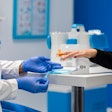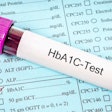
A medical diagnostic point-of-care (POC) assay for measuring traumatic brain injury biomarkers from whole blood has been cleared by the U.S. Food and Drug Administration (FDA), manufacturer Abbott announced.
FDA clearance for the i-STAT TBI cartridge means that the rapid blood test is no longer limited to plasma or serum, which are sample types that require processing and testing in a clinical laboratory rather than right at bedside, according to the announcement.
The POC traumatic brain injury (TBI) test measures two biomarkers from the brain that may be released into the bloodstream, indicating a possible brain injury, according to Abbott. Testing for these two biomarkers -- ubiquitin C-terminal hydrolase L1 (UCH-L1) and glial fibrillary acidic protein (GFAP) -- up to 24 hours after an injury may provide clinicians with essential information about a patient's condition and can help healthcare providers determine an appropriate treatment plan.
For years, TBI has been a focus of the major risks that athletes and military service people face.
In March, Army.mil reported ongoing efforts to mitigate the brain injury risk that warfighters face, including direct brain trauma that occurs from concussive blasts during training and operations.
Abbott has been in a long-term partnership since 2014 with the U.S. Department of Defense and researchers from the Transforming Research and Clinical Knowledge in Traumatic Brain Injury (TRACK-TBI) Network to evaluate the effectiveness of the POC blood test technology.
U.S. Army Medical Research and Development Command (USAMRDC) officials noted the partnership with Abbott as part of the i-STAT TBI announcement.
In 2019, Abbott inked a deal with Banyan Biomarkers (Banyan BTI) to license UCH-L1 and GFAP for TBI studies and test development.
This new clearance will enable testing to be performed in healthcare settings beyond hospital emergency departments, where the facility has a certificate to perform moderate-complexity tests, Abbott said.



















